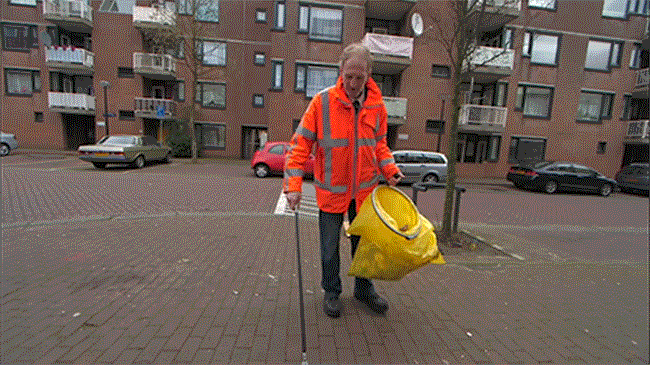
Several times a week, Coen Ruijs strolls the streets of Amsterdam, picking up tiny scraps of newspaper, empty cans and bottles of booze. He finds the occasional treasure too, which he saves from the grips of his garbage-grasper.
“A few weeks ago, I found a very good shirt,” he said. “I only had to wash it.”
Ruijs once walked these same streets delivering mail. But he lost his job to alcoholism, and now cleans the streets while trying to get clean himself. In exchange, the city offers him an unlikely reward: beer.
The crew of garbage collectors are given a warm meal, tobacco, 10 Euros and yes, five cans of beer that are rationed throughout the day. It’s part of an unconventional Dutch program that keeps addicts working instead of succumbing more to their addiction, and loitering in the local park, where many are known to get drunk and start fights or yell at people.
Ruijs said the program, while unorthodox, has helped him with his alcoholism. “Otherwise, I would be at home all day and I could be finishing one bottle after another,” he told America Tonight. “Here, it’s five small beers a day during breaks… It’s a good pastime. I like it.”
When America Tonight met Ruijs on a cold January morning in east Amsterdam, he was savoring a few swigs of his first Heineken of the day before setting out to clean the streets. He receives two beers in the morning, two in the afternoon and a final one when the cleaning project is complete.
The former musician and artist explained how hard liquor led him down a difficult path. He took his first taste when he was 17. By the time he was 25, his drinking was out of control.
“I started drinking in the morning, and well, drinking all day,” he said, adding that this could lead him to become belligerent towards strangers. “I used to drink a lot of Belgian beers, and then I started doing hard liquor – whiskey and things like that.”
He’s now one of 20 people in the program, divided into two groups, who clean the streets in shifts three days a week.
“I see a big difference from where the people start,” the program's coordinator Janet van der Noord explained. “They could not come in time. Most people came two, three, four hours too late. And now you see everybody is in time, and you see the growing interest in other aspects of their lives. That was not there when they just started.”
Van der Noord is a supervisor, but also a support system, helping those who relapse, need outside assistance or struggle to stay on track. She knows addiction well, battling drug abuse for 35 years before getting sober four years ago.
“The goal is not that the street is getting cleaner. It’s that they have got more self-respect, because they have something to do,” van der Noord said. “It gives them more sense to their lives.”
She knows there are skeptics, and that government-funded beer seems like a counterintuitive treatment option. But van der Noord believes traditional programs aren’t the best solution for everyone who deals with addiction.
“If people say, ‘I want to go to rehab, because I want to become clean,’ I would say, ‘Of course, go ahead,’” she said. “Some people aren’t ready for that yet, because they are afraid. They don’t know what to expect.”
Conservatives on the city council were unconvinced, and have called the idea a waste of money. But Fatima Elatik, district mayor of the Amsterdam borough of Oost, said problems in the park had gotten pretty bad, and amped up policing, bans and fines had no real effect. She was willing to try anything, and agreed that her district would help fund the program earlier this year.
“It’s just targeting the symptom,” she said about their previous approach. “So they would be gone from the park for a week or so, and then they would come back, because they’re not strangers. They’re people that live in our districts. They have the right to use the parks.”
Elatik said she has already witnessed changes in the personalities of the participants. One of those people is a man named Fred Schiphorst.
Underneath Schiphorst’s reflective blaze orange jacket is a man dressed for a job interview. He comes to clean the streets in a suit and a tie. He tries to wear a smile despite several personal tragedies, including the death of an old girlfriend that caused him to turn to the bottle. Elatik said she had never seen a person undergo such a radical transformation in six months.
It’s too soon to tell whether the program actually works. But in the meantime, the men have a job to do, a place to be and a chance to change.
“I try for myself,” said Schiphorst in a mix of Dutch and broken English. “Not everybody here sees it, but I try to stop [drinking] for myself. But it’s not easy. I’m fighting every day. Every day…I’m standing before the mirror, every day I tell to myself, ‘Fred, try. Do not drink this day.’"
Error
Sorry, your comment was not saved due to a technical problem. Please try again later or using a different browser.